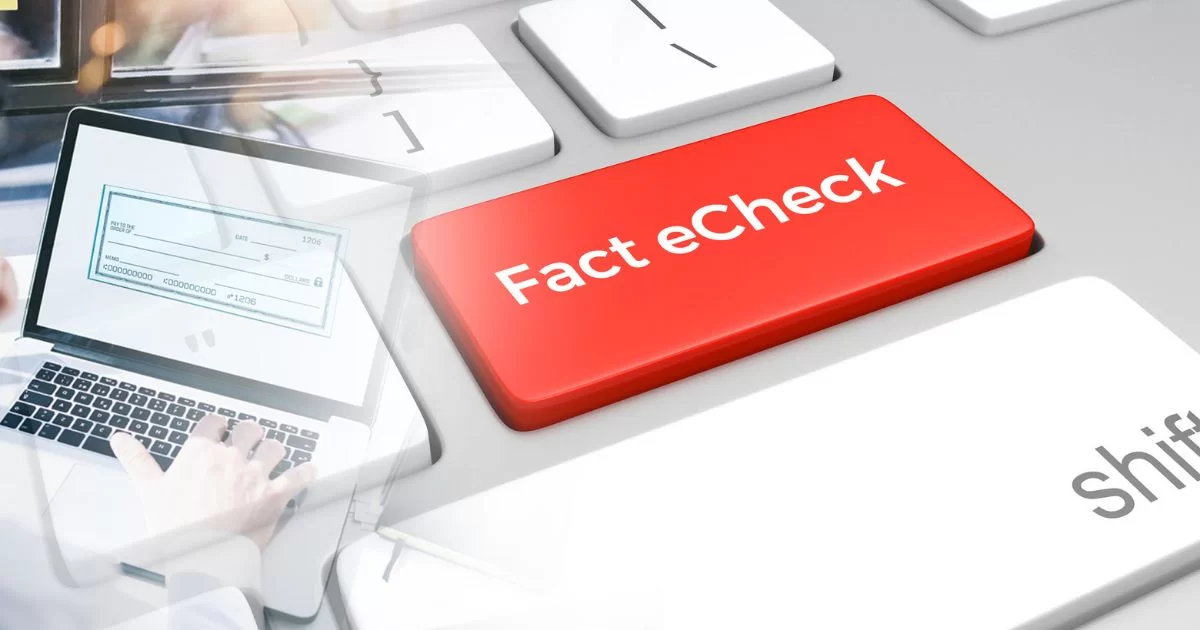
| April 23rd, 2020 |
7 Must-Read Facts About Electronic Check Payments!
Bottom line is among the most vital concerns that occupy a significant portion in the minds of small business owners. For keeping the finances stable, the first thing to do is accepting payments that are equally easy for both the business and its customers. One such form of payment is eCheck, the digital version of traditional paper check. With the help of a payment processor, an electronic check uses ACH to transfer the funds from customer’s account into the merchant’s account. Everyone knows that eChecks transmit electronically. It is because of this reason, they support safe, easy as well as quick transactions. Through this post, let us find out some more important details related to electronic check payments.
1. What differentiates eChecks from paper checks?
First things first, electronic checks are digital in nature, whereas paper checks are simply a piece of paper. While eChecks are the future, paper ones define outdated mode of payments. Moving on to the second thing, a very limited percentage of consumers look forward to write checks, as most of them are drawn towards digital payments, which include electronic checks as well.
According to the data, more & more purchases take place online. Providing utmost convenience to the users, online payments have become the source of profits for the business world.
If we go inside a bit more, eChecks are time saving as compared to paper checks. They have no manual efforts, they require less processing and they happen super fast.
2. How eChecks payments differ from credit card payments?
Let’s talk about the major difference between the two. Electronic checks depend on ACH to transfer the money unlike credit cards that use card networks. This one difference makes electronic checks ask less processing fees and credit card payments ask high processing fee. Coming to the other aspect, eChecks do not possess interchange fees. Also, fees per transaction is as low as 10 cents. Without boasting anything, this is something huge for the businesses that are involved with recurring or large payments.
3. Is there any comparison between eChecks, EFT and wire transfer?
EFT means electronic funds transfer and includes a number of electronic payments that comprise of ACH transfer, direct deposit, local bank transfers, eChecks, wire transfer, eWallets and more. Though eChecks and ACH are a form of EFT, all EFT transactions are not eChecks and ACH.
Keeping the focus on wire transfers, they are meant to transfer money from account to account. They take place manually and allow transactions one by one, while ACH transfers take place in batches. Owing to this reason, cost of wire transfer is more than ACH. Another difference between the two is that once started, wire transfers can’t be reversed. Having said that, they have less secure nature than ACH.
4. Can eChecks help to boost the finances or revenue?
Definitely. With electronic checks, businesses can expect funds pouring in. This is because there are least chances of change in the checking account numbers, which reduces the possibilities for payment breakage. There’s no doubt that electronic checks are great for every business, they are even great for the below listed businesses.
Subscription-based businesses:
Be it memberships or subscriptions, autopay, auto-renewal and recurring payments turn easy for the businesses and customers with electronic checks. On that note, businesses that have membership or subscription-based model can reap significant profits with eChecks.
Online businesses:
Businesses can sell a product and take payments monthly or yearly. For efficient sales, this is a reliable way, which is in trend since years.
Businesses accepting hefty payments:
As there’s no middleman involved to process the payments, interchange fees can be avoided and money can be saved. Businesses that process hundred or thousands of dollars can save a huge amount of money through eChecks.
5. What type of security is used with eChecks?
Words are not needed to clarify how eChecks are better than paper checks in terms of security. The main security elements of eCheck transactions are:
Authentication: Here, the one who submits the account details is verified by the payments provider. This helps to ensure that fraudulent payment details are not submitted.
Encryption: It is the process of shielding the confidential data. All ACH transactions need encryption. The reason is that most of the transactions carry out on unsecured electronic networks.
Public key cryptography: Being a part of the encryption process, it is essential for ciphering the data and securing it in transit.
Digital signature: This is also a part of the encryption process and confirms that electronic checks can’t be duplicated.
Duplicate detection: Another fraud detection strategy, it keeps an eye on controlling suspicious activities and duplicates eCheck transactions.
6. Essentials needed for eChecks include?
A business has to work with a payment processor and a financial institution to accept these checks. Depending on the manner electronic checks are accepted, needed hardware and software are decided. Essentials needed for eChecks include a few critical components to ensure smooth processing. First, the business must partner with a reliable payment processor that specializes in eCheck transactions, as well as a financial institution that can support ACH (Automated Clearing House) transfers. These partnerships enable businesses to securely receive funds directly from customers’ bank accounts.
In addition to these partnerships, specific hardware and software may be required based on the method of eCheck acceptance:
Online Gateway:
For businesses accepting eChecks online, an eCheck payment gateway is essential. This software integrates with the business’s website or point-of-sale system, allowing customers to enter their bank account details securely. The gateway facilitates the ACH transfer from the customer’s bank account to the business’s account.
Point-of-Sale System:
If eChecks are accepted in person, businesses may need a point-of-sale system capable of handling eCheck transactions. This often includes a digital check scanner to capture and verify check details quickly, streamlining the payment process at checkout.
ACH Authorization Tools:
To comply with regulations, businesses accepting eChecks need to obtain authorization from customers for each transaction. This can be done through signed agreements, recorded phone authorizations, or digital checkboxes for online payments. Proper authorization helps reduce disputes and chargebacks, protecting both the business and the customer.
Fraud Prevention Software:
Fraud prevention tools help detect any suspicious activity associated with bank accounts, such as insufficient funds or account anomalies, reducing the risk of failed transactions.
By implementing these essentials, businesses can accept eCheck payments efficiently, offering customers a secure, convenient way to pay while accessing a payment solution suited for high-risk industries.
7. Is it worth integrating eChecks into business payment options?
Absolutely! The more payment options are provided to the client the more are their chances of approaching the business and spending on it. This way, revenue grows naturally. These are some important questions & answers related to eChecks. To know more, get in touch with us and let our experts provide you with the needed assistance. Clear all your doubts and let eChecks maximize your profitability to a great level.
